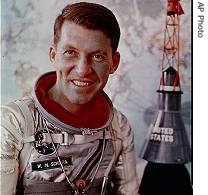2007年VOA标准英语-Pioneer US Astronaut Schirra Dies at 84(在线收听)
Washington
03 May 2007
 |
| Astronaut Walter M. Schirra Jr. is shown posed for a studio portrait in his space suit in this June 1962 file photo |
Schirra is best remembered as one of the original seven astronauts who helped take America's fledgling space program from its first tentative steps all the way to the moon.
Among his colleagues in that group were Alan Shepherd, the first American in space, and John Glenn, the first American and second human to orbit Earth after Russia's Yuri Gagarin.
Schirra, known by the nickname Wally, could be called the reluctant astronaut. He was a career Navy pilot who had flown missions in the Korean War, where he shot down two enemy Mig jet fighters, and who tested aircraft before joining NASA in 1959. He recalled having to be ordered to Washington for recruitment by the space agency, which was seeking aggressive test pilots for its experimental space missions. He initially turned them down, but said a colleague eventually convinced him to change his mind.
"The same fellow who sent me to test pilot school, Bob Elder, said, 'Wally, if you want to go higher, farther, and faster, this is the only way to do it.' So I went along with it," he said.
Schirra, with his six peers, soon became the focus of the public and press, which followed every step of the first U.S. efforts in space. He went on to pilot the fifth mission in the country's initial series of Mercury flights, orbiting Earth six times in 1962.
Three years later in 1965, Schirra commanded one of two Gemini spacecraft that became the first rocketships to rendezvous and circle each other. The mission proved that spacecraft could be maneuvered, what NASA called an encouraging technical development in the race to the moon.
Schirra also commanded the Apollo 7 mission in 1968, the first piloted flight in the Apollo series that landed men on the moon the next year.
As a result, he is the only U.S. astronaut to have flown in NASA's first three space projects, Mercury, Gemini, and Apollo.
Schirra later expressed the view that humans were meant to explore space. "It's an urge, a pioneering urge, and we humans like that. And I think that's what made us want to go to the moon as individuals. I'm not sure whether President Kennedy wanted that or whether it was a political thing just to have a cold war with the Soviets," he said.
After 10 years as an astronaut, Walter Schirra retired from NASA in 1969 to become a commentator on space missions for a U.S. television network and eventually serve on the board of directors for several corporations.